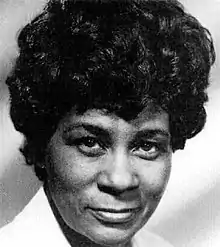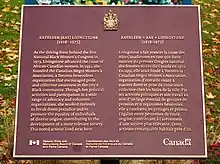Kay Livingstone
Kathleen "Kay" Livingstone (October 13, 1919 – 1975) was a social activist, actor and broadcaster. In 1973, her efforts led to the first National Congress of Black Women of Canada.[1]

The daughter of James and Christina Jenkins, she was born Kathleen Jenkins in London, Ontario. Her father was an assistant judge in the local juvenile court and her parents founded a newspaper Dawn of Tomorrow aimed at the black community. She studied music at The Royal Conservatory of Music in Toronto, Ontario and elocution at the Ottawa College of Music. During World War II, she worked for the Dominion Bureau of Statistics in Ottawa, Ontario. In 1942, she married George Livingstone;[1] the couple had five children.[2] While in Ottawa, she became the host of her own radio program, The Kathleen Livingstone Show. When the couple moved to Toronto, she hosted radio shows for several stations, including a CBC affiliate. In 1951, she joined a Toronto social club then known as The Dilettantes; it was soon renamed to the Canadian Negro Women’s Club, later the Canadian Negro Women’s Association (CANEWA), and Livingstone became its first president, serving from 1951 to 1953. The association began providing scholarships to encourage Black students to stay in school.[1] CANEWA later organized the Calypso Carnival, which later became known as Caribana.[3]
She also performed in amateur and professional theatrical productions and was referred to as "one of Canada’s leading Black actresses" during this period.[4]
Livingstone served as president of the United Nations Association in Canada, as regional chair of the National Black Coalition, as a moderator for Heritage Ontario and as a member of the Appeal Board of Legal Aid.[1]
Just before her sudden death in 1975, she was working as a consultant for the Canadian Privy Council, helping to organize a national conference for visible minority women. Livingstone is credited with first using the term "visible minority".
Legacy

Following Livingstone's death, Carrie Best formed the Kay Livingstone Visible Minority Women's Society.[3] The Kay Livingstone Award is given to Black women in Canada to encourage them to "improve the lives of other women of colour and their families".[5]
In 2011, Livingstone was recognized by the federal government as a Person of National Historic Significance.[4] A plaque reflecting that status was erected in 2017 near her Toronto home.[6][7]
In November, 2017, the postal service announced Livingstone would appear on a postage stamp in 2018, as part of its ongoing series marking Black History Month in February.[8] The stamp was issued on February 1, 2018, in London, Ontario, her birthplace.
References
- Hill, Lawrence (1996). Women of Vision: The Story of the Canadian Negro Women's Association, 1951-1976. pp. 21–23. ISBN 1895642183.
- "Kay Livingstone". Congress of Black Women of Canada Ontario.
- "Kay Livingstone". Celebrating Women's Achievements. Library and Archives Canada.
- "Women in Canadian History". Parks Canada. March 7, 2012.
- Herstory. 2012. p. 40. ISBN 978-1550504545.
- Kathleen (Kay) Livingstone (1918-1975) historical marker, TorontoPlaques.com
- The Government of Canada Recognizes the National Historic Importance of Kathleen “Kay” Livingstone , Parks Canada news release, September 24, 2017
- Lincoln Alexander, Emergency Responders, and Women in Winter Sports among new stamps to be issued in 2018, Canada Post news release, November 13, 2017